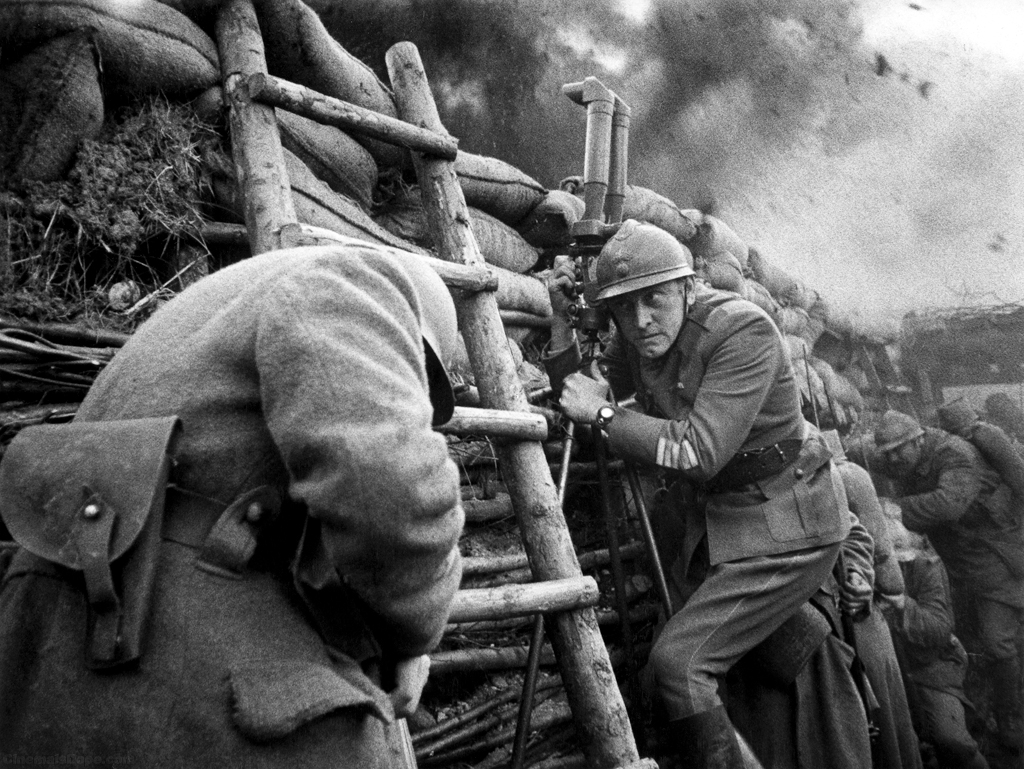The second studio venture from future auteur Stanley Kubrick, it’s tempting to compare Paths of Glory to the bitingly satirical likes of 1964’s Dr Stangelove or 1987’s Full Metal Jacket, but to bundle it into a larger “anti-war” canon does it a disservice.
Based on Humphrey Cobb’s 1935 potent novel of the same name, Paths of Glory tells the story of many interwoven fates in the pursuit and aftermath of a doomed attack on a German strongpoint, with Kirk Douglas’ sympathetic Colonel Dax as the bonding agent, his role boosted from the text to support his star power.
Set in 1916, this fictional account of a handful being unjustly tried for cowardice for a whole body of men failing to leave their trenches was inspired by the execution of four French corporals at Souain in 1915. In common with this shameful account, Paths of Glory has a petulant commander demanding the shelling of his own lines and the officer in charge of the artillery refusing without a written order.

From the micro to the macro: the film’s mood reflects the wider tone of unrest, war-weariness and overreaction that followed the mutinies of 1917, an event that eventually led to reforms in the way that the French Army pursued the war, but not without loss of life and liberty. In total 3,427 courts martial, 2,878 sentences of hard labour and 629 death sentences, of which 43 were carried out. Small for the scale of the dissent, but like the Souain affair and Cobb/Kubrick’s fictionalised account, a token splash of blood was shed to serve as an example to others.
In a subversion of expected narrative Dax – before the war “the foremost criminal lawyer in France” – is unable to win in a court martial that seems predestined. His seemingly crucial discovery of General Mireau (George Macready)’s attempt to shell their own lines results in the general’s disgrace, but only after the men have already faced the firing squad – vital for discipline and for the reputation of the French Army sensitive to the opinion of the press.
It’s a potent criticism of vanity, hypocrisy and ego – and a warrior code that demands unquestioning obedience in the very face of insanity.
The sweeping battlefield vistas and tracking shots of trenches under fire are as truthful a depiction of the Western Front as we’ll ever seen on screen, but much of Paths of Glory reflects a particular interpretation of history – that of Kubrick, the blackly-humoured peacenik, and Cobb, the embittered veteran of Marne.

Hardening the tropes that would bloom into full-blown myths the 1960s, Paths of Glory demonstrates the obsession with totting up land taken against the lives lost in taking it. This represents an inability to fully understand the nature of the First World War – and of attrition warfare in general.
Similarly, the spirit of “lions led by donkeys” – trite assertion that masks a complexity of motives and circumstances – gets an outing as French Army’s real enemy are shown not to dwell in the opposing dugouts, but in elegantly marbled châteaux behind the lines where men are gambled away over aperitifs.
Cobb, writing in 1933 before the novel’s publication, fumed:
“I have been reading—saturated as they are with pettiness, lousiness, and bickerings—of the men who sent those other poor devils to that frightful butchery.”
That, as much as anything, could read as a synopsis for Paths of Glory. It’s true to a point, but it’s also a perspective dripping with prejudice from an author who declared:
“The only available effective anti-war propaganda that I know is photographs of butchered bodies—the more horrible the better.”

Cobb’s view is valid of course, and it’s a view that’s rooted in fact, but it has to be acknowledged for what it is to be truly valuable. Both the book and the film are worthy documents – and as a product of Cobb’s own at the Battle of Amiens, doubly so – but it is only as a companion to study that Paths of Glory can enhance our understanding of the Great War and the men who pursued it.
To quote veteran of Verdun and leading French chronicler of the war, Maurice Genevoix:
“It is neither desirable nor good that the professional historian prevail over the veteran; it is also not good that the veteran prevail over the historian.
“This is why the history of the 1914-18 war remains so hard to write.”
Paths of Glory is available on Blu-ray from 19 September as part of Eureka!’s Masters of Cinema series. For more on World War I picked up the new issue of History of War or subscribe now and save 25% off the cover price.
